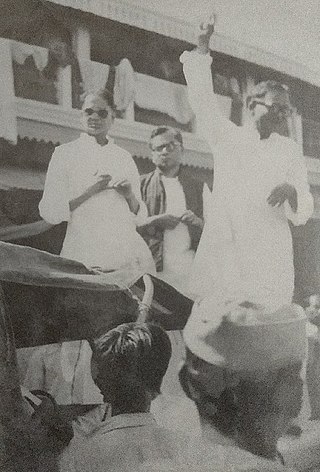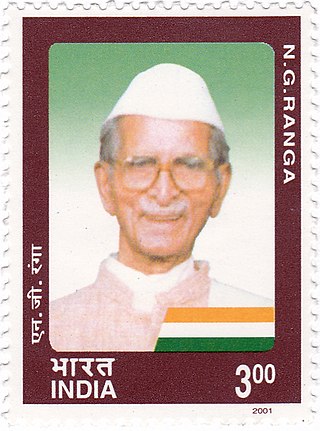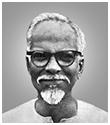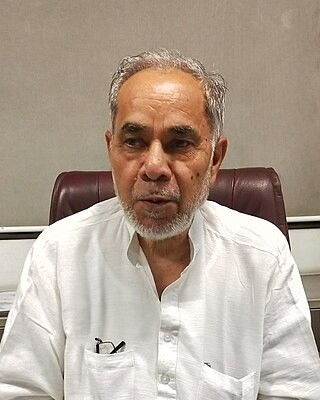
Jayaprakash Narayan Srivastava, also known as JP and Lok Nayak, was an Indian politician, theorist and independence activist. He is mainly remembered for leading the mid-1970s opposition against Prime Minister Indira Gandhi and calling for her overthrow in a "total revolution". In 1999, Narayan was posthumously awarded the Bharat Ratna, India's highest civilian award, in recognition of his social service. His other awards include the Magsaysay award for public service in 1965.

The Janata Party is an unrecognised political party in India. It was founded as an amalgam of Indian political parties opposed to the Emergency that was imposed between 1975 and 1977 by Prime Minister Indira Gandhi of the Indian National Congress. In the 1977 general election, the party defeated the Congress and Janata leader Morarji Desai became the first non-Congress prime minister in independent modern India's history.

The Quit India Movement was a movement launched at the Bombay session of the All India Congress Committee by Mahatma Gandhi on 8 August 1942, during World War II, demanding an end to British rule in India.

The Congress Socialist Party (CSP) was a socialist caucus within the Indian National Congress. It was founded in 1934 by Congress members who rejected what they saw as the anti-rational mysticism of Gandhi as well as the sectarian attitude of the Communist Party of India towards the Congress. Influenced by Fabianism as well as Marxism-Leninism, the CSP included advocates of armed struggle or sabotage (such as Yusuf Meherally, Jai Prakash Narayan, and Basawon Singh as well as those who insisted upon Ahimsa or Nonviolent resistance. The CSP advocated decentralized socialism in which co-operatives, trade unions, independent farmers, and local authorities would hold a substantial share of the economic power.

The Praja Socialist Party, abbreviated as PSP, was an Indian political party. It was founded in 1952 when the Socialist Party, led by Jayaprakash Narayan, Rambriksh Benipuri, Acharya Narendra Deva and Basawon Singh (Sinha), merged with the Kisan Mazdoor Praja Party led by J. B. Kripalani.

Ram Manohar Lohia was an Indian freedom fighter of the Indian independence movement and a socialist politician. As a nationalist, he worked actively to protest against colonialism, raising awareness of the same. He founded multiple socialist political parties and later won elections to the Lok Sabha.

Indian nationalism is an instance of territorial nationalism, which is inclusive of all of the people of India, despite their diverse ethnic, linguistic and religious backgrounds. Indian nationalism can trace roots to pre-colonial India, but was fully developed during the Indian independence movement which campaigned for independence from British rule. Indian nationalism quickly rose to popularity in India through these united anti-colonial coalitions and movements. Independence movement figures like Mahatma Gandhi, Subhas Chandra Bose, and Jawaharlal Nehru spearheaded the Indian nationalist movement. After Indian Independence, Nehru and his successors continued to campaign on Indian nationalism in face of border wars with both China and Pakistan. After the Indo-Pakistan War of 1971 and the Bangladesh Liberation War, Indian nationalism reached its post-independence peak. However by the 1980s, religious tensions reached a melting point and Indian nationalism sluggishly collapsed in the following decades. Despite its decline and the rise of religious nationalism, Indian nationalism and its historic figures continue to strongly influence the politics of India and reflect an opposition to the sectarian strands of Hindu nationalism and Muslim nationalism.
Asoka Mehta was an Indian freedom fighter and socialist politician. He helped organize the socialist wing Congress Socialist Party of the Indian National Congress, along with Rambriksh Benipuri, Jaya Prakash Narayan, and was heavily involved in the politics and government of the city of Bombay.

Basawon Singh or Basawan Singh also known as Basawon Sinha, was an Indian independence activist and a campaigner for the rights of the underprivileged, and industrial and agricultural workers.

Mahatma Gandhi Kashi Vidyapith is a public university located in Varanasi, Uttar Pradesh, India. Established in 10 February 1921 as Kashi Vidyapith and later renamed, it is administered under the state legislature of the government of Uttar Pradesh. It got University status in 1974 as Deemed to be University and State University status in 2009 by The Uttar Pradesh State Universities (Amendment) Act, 2008. The university has more than 400+ affiliated colleges spread over six districts. It is one of the largest state universities in Uttar Pradesh, with hundreds of thousands of students, both rural and urban. It offers a range of professional and academic courses in arts, science, commerce, agriculture science, law, computing and management.

AcharyaGogineni Ranga Nayukulu, also known as N. G. Ranga, was an Indian freedom fighter, classical liberal, parliamentarian and farmers' leader. He was the founding president of the Swatantra Party, and an exponent of the peasant philosophy. He received the Padma Vibhushan award for his contributions to the Peasant Movement. N.G. Ranga served in the Indian Parliament for six decades, from 1930 to 1991.

Yogendra Shukla was an Indian nationalist and freedom fighter, notable for his contributions in the state of Bihar. He was incarcerated in the Cellular Jail, also known as Kala Pani, and was a founding member of the Hindustan Socialist Republican Association (HSRA). Shukla, in collaboration with Basawon Singh (Sinha), was also instrumental in establishing the Congress Socialist Party in Bihar.

Nabakrushna Choudhury was an Indian politician and activist. He served as Chief Minister of the Indian state of Odisha. He was a freedom fighter who participated in the Non-cooperation Movement, the Civil Disobedience movement, and the Peasant movement.
The Kisan Mazdoor Praja Party, or Praja Party for short, was a political party of India. Established in 1951, it merged with the Socialist Party to form the Praja Socialist Party in the following year. The Andhra unit of the party, however, revived the old party under the name "Praja Party" and lasted for a few more years.
Hasubhai Zinzuwadia was an Indian cricketer. He was a right-handed batsman and right-arm offbreak bowler who played for Gujarat. He was born in Ahmedabad.
The Janata Morcha was a coalition of Indian political parties formed in 1974 to oppose the government of Indian Prime Minister Indira Gandhi and her Congress (R) party. The coalition was an integral part of the popular movement against the Emergency rule of Indira Gandhi and the direct predecessor of the Janata Party, which defeated the Congress (R) in the 1977 Indian general election to form the first non-Congress government in independent India. It was formed by Jayaprakash Narayan and Morarji Desai, chief of the main opposition Congress (O) party.

Ram Bahadur Rai is a senior Hindi journalist. He is Former news editor of Hindi daily Jansatta. He has published and authored and edited several of books. He is known for some impressive biographies, written in Hindi, namely Shashwat Vidrohi Rajneta based on life and acts of Gandhian socialist Acharya J. B. Kripalani, Rahvari ke Sawal on Chandrashekhar and Manjil se Jyada Safar on V P Singh. He was a close associate of the Indian freedom fighter and political leader Jayaprakash Narayan and was also part of a Steering Committee of JP Movement.

Achyut Patwardhan was an Indian independence activist and political leader and founder of the Socialist Party of India. He was also a philosopher who believed fundamental change in society begins with man himself.
Abbas Ali was an Indian freedom fighter and politician who was a captain in the Indian National Army led by Subhas Chandra Bose. Later he joined the Socialist movement and was a close associate of Ram Manohar Lohia.
K G Kannabiran was a human rights activist and a lawyer of the Andhra Pradesh High Court in the Indian state of Andhra Pradesh (AP). He was cofounder and National President of People's Union for Civil Liberties (PUCL).














